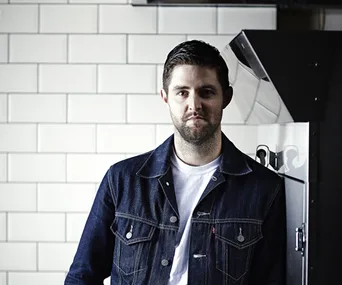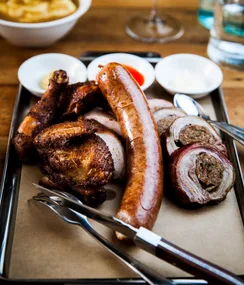Previously on this page: we talked about what Sydney really needed was a restaurant that took bookings, kept its dining room above 20 lumens and below 85 decibels, and didn’t expect diners to share food or – heaven forfend – tables. That was last month. This month we would like to give our more sensitive readers a trigger-warning: the following review contains depictions of communal eating, natural wine themes and frequent coarse beards. Bauer Media Australia advises diner discretion.
When Luke Powell was head chef at Tetsuya’s, the skills he had picked up working at famed Basque restaurant Mugaritz were on show – he’d emulsify fish stock with oil, cider vinegar and honey to make a pil-pil sauce for yellow-belly flounder, decorating it with petals of pickled onion, or whip bean curd, goat’s curd and cream to make a radical accompaniment for raw scampi. But his cooking at LP’s Quality Meats, the Chippendale restaurant he opened in September with the backing of Porteño‘s Joe Valore and Elvis Abrahanowicz, couldn’t be more different.
A meal at Tetsuya’s typically comprises a medley of barely cooked seafood dishes, followed by slow-poached meat dishes. A meal at LP’s kicks off with some cured and pickled stuff, then proceeds directly to a yabba-dabba-doo-worthy platter of smoked meats served family-style. Mirin and seaweed don’t enter into it, and there’s not a confit fish in sight. I also can’t recall the last time I heard Tetsuya drop a track by The Black Keys.
Stepping through the sliding glass doors and getting socked in the face by a wall of sound, you could be forgiven for thinking that Powell has jumped on the Americana bandwagon. There’s merch to the left of you, the big smoker to the right and here you are, stuck in the middle of a room full of Chippendale types (they’re like Surry Hillbillies, only more richly tattooed, and with better taste in wine) crowding rows of low, refectory-style tables. But there’s a subtler genius at work here.
The kitchen runs most of the length of the room, the pass strung with sausages, a bone saw, meat hooks and cowbells. Its centrepiece, the Southern Pride gas-fired (but wood-burning) smoker is as big as a family car and at least as expensive. This one has a smoking-woodpecker decal on the side rather than a stick-figure family. The kitchen’s size says it loud and proud: this is a chef’s restaurant. I imagine most restaurateurs would’ve made the kitchen only half as large and given the rest of the space over to bar seating. Certainly manager-sommelier James Audas and his brother-in-arms, bar manager Tom Sheer, have created a drinks package that offers plenty of motivation to linger before and after dinner. The beer is draught, the cocktails are potent, the back bar interesting.
The wine list has plenty of sizzle. It’s the sort of document that prompts newspaper wine columnists to dash off rants about sommeliers foisting their perverted desires upon the unsuspecting public. There’s not much in the cellar made in industrial quantities by multinational booze behemoths, that’s for sure. There’s plenty of Australian wine to complement the Argentinian malbec and sparkling from Burgundy, but it’s more likely to be vermentino from Heathcote and pinot from the Adelaide Hills than Hunter sémillon and Coonawarra cab. Audas and Sheer also import some seriously funky stuff themselves – Audas developed a taste for riesling grown in upstate New York when he worked at Black, and the semi-dry offering he pours from Hermann Wiemer, an established Finger Lakes producer, is one of the finer examples of American white-winemaking you’ll see in Australia today. He also worked at Noma for a spell, and I wonder if that played a part in the appreciation he appears to harbour for wines from middle Europe. There’s plenty of good stuff from Germany and Austria on the list, but so far the standout for me has been a kékfrankos from Hungarian winemaker Peter Wetzer. Kékfrankos, Audas says, is Hungary’s name for blaufränkisch. If that provenance seems wilfully obscure, the appeal of this perfumed, elegant wine is anything but. At $78, it’s on the more reasonably priced side of the list, too. Given that so many of the diners are closer to 30 than 50, there’s surprisingly little here under the $60 mark.
So about those quality meats. First there’s the cold cuts: coppa di testa, Italy’s answer to fromage de tête and brawn – bits of pig’s head set in clear jelly and sliced. There’s lush ribbons of pork-belly ham, rounds of bierwurst, a fine-grained sausage of pork and beef.
A couple of pickled hot green chillies adorn the platter along with a dish of wild small black olives, and a pair of nicely yeasted pretzel sticks, which the waiter says are delicious dipped in Dijon mustard. He’s not wrong. The only other things passing for entrées are some beautifully silvery pickled sardines, an escabechey brunoise of carrot in the pickle, a dollop of mayo on the plate. To render the smoked salmon a thrill, meanwhile, the kitchen doesn’t look to the Pacojet or stunt-casting of ingredients; it simply lays it out on the plate as well as it can. It’s smoked in-house (of course), cut into thickish slices and teamed with its old friends dill and raw onion. Fried capers bring an appealing nuttiness to the arrangement and some crunch. So far so minimal, but it doesn’t feel ungenerous or careless.

This is very much sharing food, so showing up with a posse is a good idea. The main courses – or rather the stuff on the menu under the heading Smoked Meats – sail out on the same sort of metal platters. Lamb belly rolled around merguez is more interesting than delicious, the meat tight, the fat largely unrendered after its time in the smoker. Good but not great. Lamb shoulder is nicely brown and tender, but doesn’t really break any new ground. The Toulouse sausage, a mildly spiced whopper, is more like it, but the chicken is where the LP’s gang have really struck gold – sold in the half or whole bird, it’s double-cooked, taking a quick dip in the deep-fryer before hitting the table, and the result is a bird that’s smoky, juicy and crisp in all the right ways. The tight grain of the meat suggests it’s been brined first, too – no bad thing. It leaves the Frango’s chooks of Petersham in the rear-view mirror and brings serious competition to the offerings at Granville’s fabled El Jannah. The beef tri-tip (the exciting bit at the end of the sirloin) is also a real stunner – the sort of thing that gets barbecue enthusiasts very fired up, even if Luke Powell is adamant this isn’t just another wannabe barbecue shack. Stuffed into one of the lovely soft American-style rolls with some pickles, it’s a thing of beauty. Smoky, too.
“Does this all taste a bit samey to you?” asks a girl at my table. And while questioning the smokiness of things at a smokehouse may seem like going for sushi and wondering what’s going on with all the raw fish, it’s a fair point. Is there enough light and shade here to keep you hungering for more? The acidity levels play their part, but I think it comes down to the sides. At the similarly meat-centric Porteño and Rockpool Bar & Grill, the sides are small miracles in themselves, whether defined by restraint (Rockpool’s take on St John’s carrots) or exuberance (Porteño’s Momofuku-ish fried Brussels sprouts). At LP’s it’s a work in progress.
The Niçoise doesn’t quite gel enough to stand on its own (I’m not sold on the white anchovies subbed for tuna) but has a bit too much going on to complement the meats as a straight side. Kale with chickpeas is heavily sauced, and the gooey eggplant salad is again too plain to stand as a solo but so rich that it’s a bit competitive as a side. But they nail it with the corn on the cob (well coloured from the smoker) and the mash with gravy (enriched with chicken fat, a hangover from Powell’s time at Mary’s).
The menu lists just one dessert, the pouding chômeur, a French-Canadian dish which loosely translates as unemployment pudding. It’s a tribute to the Québécois spirit, then, that rather than firing up the dole-bowl and gathering around something profoundly depressing and calorific from Domino’s, they came up with a profoundly calorific and cheering maple-syrupy cake thing instead. Kimberley Gastmeier’s version is just shy of a foot wide, served in a foil tin hot from the oven and topped with a scoop of ice-cream. Gastmeier knows her stuff. Give me her beautifully made Paris-Brest, the almond-crusted choux sandwiching praline cream, over any 10 given examples of the ubiquitous crumble-quenelle-smear-dust routine.
There are those who would say that a chef with a background at Tetsuya’s and Mugaritz stepping away from the foam guns to open a place with staff decked out in branded tees and caps is a regression. But if they’re blind to the exacting detail Luke Powell and his team bring to bear on their corner of the food universe, then there’s no helping them. I’m happy to live in a city where I can sit down to a meal rich in truffles and Serge Gainsbourg one night, then hunker down over a mighty platter of quality smoked meats the next while the stereo plays The Datsuns’ “MF from Hell”, and find equal dedication on the part of both restaurants. This is Sydney, after all. We’re not about one thing to the exclusion of the other – we want both. And you’d best make that a double-helping.



